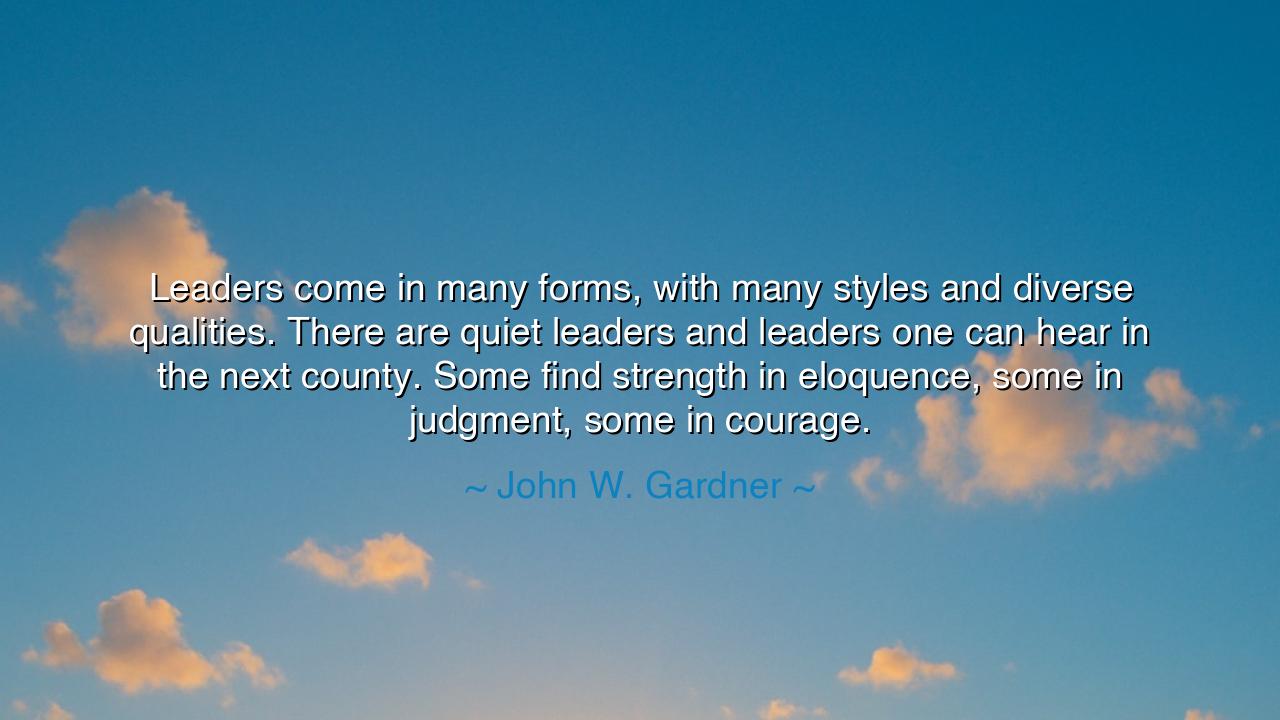
Leaders come in many forms, with many styles and diverse
Leaders come in many forms, with many styles and diverse qualities. There are quiet leaders and leaders one can hear in the next county. Some find strength in eloquence, some in judgment, some in courage.






The wise statesman and teacher John W. Gardner, whose voice once guided a generation toward renewal and service, wrote with deep understanding of the human spirit: “Leaders come in many forms, with many styles and diverse qualities. There are quiet leaders and leaders one can hear in the next county. Some find strength in eloquence, some in judgment, some in courage.” In these words lies a truth both humble and profound—the recognition that leadership is not one face, one voice, or one path, but a living spectrum of qualities shaped by time, purpose, and heart. Gardner reminds us that greatness wears many garments; that to lead is not to conform to an image, but to embody a calling.
The origin of these words reflects Gardner’s lifelong devotion to the cultivation of civic virtue and moral leadership. As a reformer, philosopher, and public servant, he saw leadership not as a matter of title or charisma, but of character and contribution. He lived through times when the world demanded heroes of different kinds—those who could stand before crowds and inspire multitudes, and those who, unseen, sustained institutions and people with quiet strength. From this vantage, Gardner discerned that leadership cannot be confined to one mold; it arises wherever courage and conscience meet. His words are not a description of power, but a hymn to diversity of spirit—to the many ways in which the human soul can rise to guide and serve.
“There are quiet leaders,” he says, “and leaders one can hear in the next county.” How true this is. Some lead with thunder, and some with the still small voice of wisdom. There is the leader who commands with presence, like Winston Churchill, whose booming voice steadied a nation through the fires of war. And then there is the leader who whispers through deed rather than word, like Rosa Parks, whose single act of defiance carried the weight of centuries. Her silence was more powerful than speeches; her stillness moved millions. Both are leaders, and both are needed—for the world is not sustained by noise alone, but by conscience. Gardner teaches that leadership is not about the volume of one’s voice, but the depth of one’s truth.
He continues: “Some find strength in eloquence, some in judgment, some in courage.” In these three pillars lies the architecture of all true leadership. Eloquence stirs hearts, giving vision and form to the unspoken desires of a people. Judgment guides that passion, ensuring that action flows not from impulse but from understanding. And courage—that sacred fire of the soul—gives the will to act, even when fear or failure threatens to undo all. Yet no single leader possesses all three in equal measure. Each must draw from what the spirit grants them. Some are poets of action; others, sages of reason. The wise do not envy another’s gifts, but use their own faithfully for the good of all.
History, too, bears witness to Gardner’s wisdom. Consider Abraham Lincoln, whose leadership was quiet, thoughtful, and born of sorrow. He was not eloquent in the manner of the fiery orator, yet when he spoke, every word carried the gravity of truth. His judgment was his anchor; his courage, his compass. Or think of Mahatma Gandhi, who wielded no sword, commanded no army, yet led millions through the strength of conviction alone. His was the eloquence of simplicity, the courage of peace, and the judgment of compassion. Such men did not lead because they sought power—they led because they answered the call of conscience. Gardner’s words honor them, and all like them, as eternal examples of what leadership truly means.
From these reflections, we learn that leadership is not the privilege of a few, but the duty of many. Every soul is called, at some hour, to stand for something greater than itself—to lift, to guide, to protect, to heal. Some will lead through words, others through action, still others through the quiet strength of presence. The farmer who teaches his children patience, the teacher who awakens a student’s curiosity, the friend who offers comfort in despair—all are leaders in the garden of human life. For leadership is not dominion; it is service. It is the willingness to light a lamp, however small, against the encroaching dark.
So, my child, take this wisdom of John W. Gardner into your heart: seek not to imitate the forms of others, but to find your own way of leading. Ask yourself not, “Am I loud enough?” but, “Am I true enough?” Do you act with eloquence, guided by integrity in your words? Do you act with judgment, seeing clearly before you decide? Do you act with courage, even when the world resists you? These are the marks of a leader, whether known to all or to none.
Thus, Gardner’s words live on as both a tribute and a charge—to honor the many faces of leadership, and to awaken it within ourselves. For the world needs not one kind of leader, but many: the bold and the gentle, the dreamer and the doer, the voice that commands and the silence that steadies. And if you carry even one of these within you—if you act with eloquence, judgment, or courage—then you too are a leader in the great procession of humanity, guiding the way forward through the ages.






AAdministratorAdministrator
Welcome, honored guests. Please leave a comment, we will respond soon